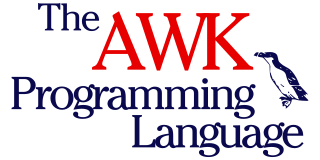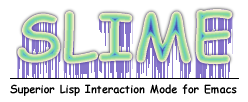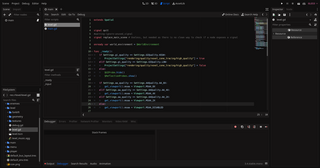
AWK is a domain-specific language designed for text processing and typically used as a data extraction and reporting tool. Like sed and grep, it is a filter, and is a standard feature of most Unix-like operating systems.
William Frederick Schelter was a professor of mathematics at The University of Texas at Austin and a Lisp developer and programmer. Schelter is credited with the development of the GNU Common Lisp (GCL) implementation of Common Lisp and the GPL'd version of the computer algebra system Macsyma called Maxima. Schelter authored Austin Kyoto Common Lisp (AKCL) under contract with IBM. AKCL formed the foundation for Axiom, another computer algebra system. AKCL eventually became GNU Common Lisp. He is also credited with the first port of the GNU C compiler to the Intel 386 architecture, used in the original implementation of the Linux kernel.

Common Lisp (CL) is a dialect of the Lisp programming language, published in American National Standards Institute (ANSI) standard document ANSI INCITS 226-1994 (S2018). The Common Lisp HyperSpec, a hyperlinked HTML version, has been derived from the ANSI Common Lisp standard.

Emacs Lisp is a Lisp dialect made for Emacs. It is used for implementing most of the editing functionality built into Emacs, the remainder being written in C, as is the Lisp interpreter.
The Portable Operating System Interface is a family of standards specified by the IEEE Computer Society for maintaining compatibility between operating systems. POSIX defines both the system and user-level application programming interfaces (APIs), along with command line shells and utility interfaces, for software compatibility (portability) with variants of Unix and other operating systems. POSIX is also a trademark of the IEEE. POSIX is intended to be used by both application and system developers.
Yacc is a computer program for the Unix operating system developed by Stephen C. Johnson. It is a lookahead left-to-right rightmost derivation (LALR) parser generator, generating a LALR parser based on a formal grammar, written in a notation similar to Backus–Naur form (BNF). Yacc is supplied as a standard utility on BSD and AT&T Unix. GNU-based Linux distributions include Bison, a forward-compatible Yacc replacement.
In the Unix operating system, shar is an archive format created with the Unix shar utility. A shar file is a type of self-extracting archive, because it is a valid shell script, and executing it will recreate the files. To extract the files, only the standard Unix Bourne shell sh is usually required.
Interlisp is a programming environment built around a version of the programming language Lisp. Interlisp development began in 1966 at Bolt, Beranek and Newman in Cambridge, Massachusetts with Lisp implemented for the Digital Equipment Corporation (DEC) PDP-1 computer by Danny Bobrow and D. L. Murphy. In 1970, Alice K. Hartley implemented BBN LISP, which ran on PDP-10 machines running the operating system TENEX. In 1973, when Danny Bobrow, Warren Teitelman and Ronald Kaplan moved from BBN to the Xerox Palo Alto Research Center (PARC), it was renamed Interlisp. Interlisp became a popular Lisp development tool for artificial intelligence (AI) researchers at Stanford University and elsewhere in the community of the Defense Advanced Research Projects Agency (DARPA). Interlisp was notable for integrating interactive development tools into an integrated development environment (IDE), such as a debugger, an automatic correction tool for simple errors, and analysis tools.
mv is a Unix command that moves one or more files or directories from one place to another. If both filenames are on the same filesystem, this results in a simple file rename; otherwise the file content is copied to the new location and the old file is removed. Using mv requires the user to have write permission for the directories the file will move between. This is because mv changes the content of both directories involved in the move. When using the mv command on files located on the same filesystem, the file's timestamp is not updated.
Embeddable Common Lisp (ECL) is a small implementation of the ANSI Common Lisp programming language that can be used stand-alone or embedded in extant applications written in C. It creates OS-native executables and libraries from Common Lisp code, and runs on most platforms that support a C compiler. The ECL runtime is a dynamically loadable library for use by applications. It is distributed as free software under a GNU Lesser Public License (LGPL) 2.1+.
GNU Common Lisp (GCL) is the GNU Project's ANSI Common Lisp compiler, an evolutionary development of Kyoto Common Lisp. It produces native object code by first generating C code and then calling a C compiler.

Linux is a generic name for a family of open-source Unix-like operating systems based on the Linux kernel, an operating system kernel first released on September 17, 1991, by Linus Torvalds. Linux is typically packaged as a Linux distribution (distro), which includes the kernel and supporting system software and libraries, many of which are provided by the GNU Project.

SLIME, the Superior Lisp Interaction Mode for Emacs, is an Emacs mode for developing Common Lisp applications. SLIME originates in an Emacs mode called SLIM written by Eric Marsden. It is developed as an open-source public domain software project by Luke Gorrie and Helmut Eller. Over 100 Lisp developers have contributed code to SLIME since the project was started in 2003. SLIME uses a backend called Swank that is loaded into Common Lisp.

GNU Emacs is a free software text editor. It was created by GNU Project founder Richard Stallman, based on the Emacs editor developed for Unix operating systems. GNU Emacs has been a central component of the GNU project and a flagship project of the free software movement. Its tag line is "the extensible self-documenting text editor."
Emacs, originally named EMACS, is a family of text editors that are characterized by their extensibility. The manual for the most widely used variant, GNU Emacs, describes it as "the extensible, customizable, self-documenting, real-time display editor". Development of the first Emacs began in the mid-1970s, and work on GNU Emacs, directly descended from the original, is ongoing; its latest version is 29.4, released June 2024.

Unix is a family of multitasking, multi-user computer operating systems that derive from the original AT&T Unix, whose development started in 1969 at the Bell Labs research center by Ken Thompson, Dennis Ritchie, and others.

In computing, a script is a relatively short and simple set of instructions that typically automate an otherwise manual process. The act of writing a script is called scripting. Scripting language or script language describes a programming language that it is used for scripting.
Getopt is a C library function used to parse command-line options of the Unix/POSIX style. It is a part of the POSIX specification, and is universal to Unix-like systems. It is also the name of a Unix program for parsing command line arguments in shell scripts.

PicoLisp is a programming language, a dialect of the language Lisp. It runs on operating systems including Linux and others that are Portable Operating System Interface (POSIX) compliant. Its most prominent features are simplicity and minimalism. It is built on one internal data type: a cell. On the language level, a programmer can use three different data types being represented by cells and differentiated by bits at the end of the cell. It is free and open-source software released under an MIT License (X11).






